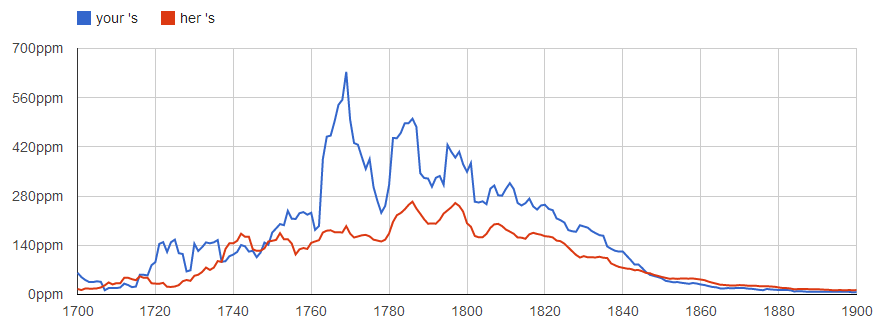I'm reading Jane Austen's Sense and Sensibility, and I notice that she invariably uses an apostrophe with possessive pronouns — in a way that would be considered incorrect now. For example: (Elinor is speaking to Colonel Brandon)
My gratitude will be insured immediately by any information tending to that end, and her's must be gained by it in time. Pray, pray let me hear it. (Volume II, Chapter IX, page 153 of the Oxford World's Classics edition, emphases in original)
Assuming that Austen is a reasonably good yardstick for proper style of her time, I'm wondering when this practice came to be considered incorrect. (Note that there are some related questions, especially this one. But that question's answers don't get into any real detail about the when part of the question.)
Edit: @FumbleFingers points out in the comments that my example may be a bad one. In the original, the sentence would have had "HERS" (and no apostrophe). My larger point stands, and here are a few other examples without that problem:
When they stopped at the door, Mrs. Jennings recollected that there was a lady at the other end of the street on whom she ought to call; and as she had no business at Gray's, it was resolved, that while her young friends transacted their's, she should pay her visit and return for them. (Chapter 33)
But at last she found herself with some surprise, accosted by Miss Steele, who, though looking rather shy, expressed great satisfaction in meeting them, and on receiving encouragement from the particular kindness of Mrs. Jennings, left her own party for a short time, to join their's. (Chapter 38)
That conviction must be every thing to you; and he is undoubtedly supported by the same trust in your's. (Chapter 24)
Those examples are all taken from the Gutenberg edition online.
Edit after closing: It's funny that this should be closed so soon after the blog post about The War of the Closes. The alleged duplicate does not talk about my question, namely when did good usage shift forms like her's, their's, etc. to hers, theirs, etc. Nor does the only answer to that question address the when question. That other question and its answer are about whether forms like hers came to exist by analogy with the possessive of nouns, such as John's. It's a completely different question. In addition, this question now has a reasonably good answer. There's no reason for this to be closed.

